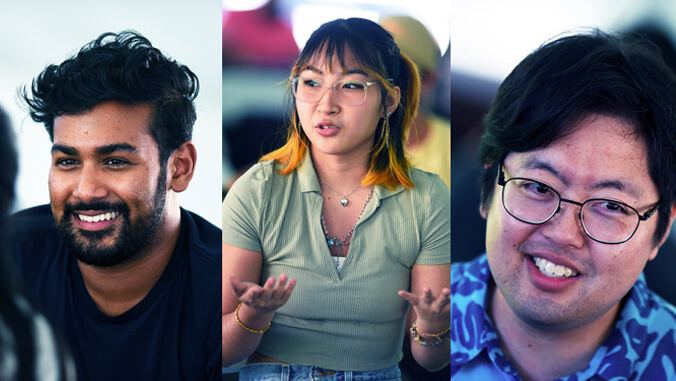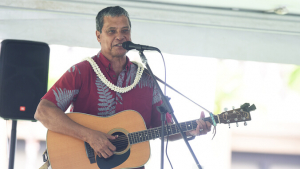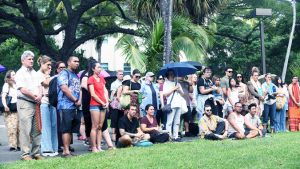
On a journey to weave threads of unity and deeper connections, the University of Hawaiʻi at Mānoa Native Hawaiian Place of Learning (NHPoL) Advancement Office hosted the Hawaiʻi Kuʻu Home Aloha (HKHA) summit January 16–18. The second annual event held at UH’s flagship campus guided haumāna (students), employees and the community through a wide range of immersive workshops on oli (chant), mele (song) and storytelling.
The summit held special significance as it coincided with the 131st commemoration of the overthrow of the Hawaiian Kingdom and the 8th annual National Day of Racial Healing, creating a space for contemplation and connection among communities while centering ʻāina.
“A student reporter asked me if I could summarize the goal of the summit in one word. I said pilina; a connection or relationship to self, others, and/or ʻāina. And we saw and heard that over and over again happening throughout the summit. So that makes us really happy,” said Kaiwipunikauikawēkiu Punihei Lipe, Native Hawaiian Affairs Program Officer at UH Mānoa.

HKHA: Harmony through melody
On January 16, HKHA began as a transformative journey for more than 200 participants who gathered under a sprawling tent on Hawaiʻi Hall lawn. NHPoL team members taught crowd members how to chant Welina Mānoa, a chant composed by UH Mānoa ʻōlelo Hawaiʻi (Hawaiian language) Professor Keawe Lopes. Hawaiʻinuiākea Dean Jon Osorio shared various mele and described the underlying significance of lyrics for Hawaiian compositions such as Ka Leo O Ka Manu, which represents a call to the children of the land, and Me Ke Aloha Kuʻu Home O Kahaluʻu, a song written about a beloved home that withstands the changes of Hawaiʻi’s landscape.
Along McCarthy Mall, faculty, staff and students from a variety of departments at UH Mānoa set up booths to share traditions and knowledge from Pacific Islander, Filipino, Black, Chinese and Native Hawaiian ethnic populations that have called Hawaiʻi home throughout history.

Reflections and tributes
HKHA’s second day encouraged participants to collectively reflect on the Hawaiian Monarchy overthrow. Hoʻokupu (offerings) such as lei and oli were presented at Ke Ahu o Kamakaʻeha (Liliʻuokalani altar) in front of Queen Liliʻuokalani Center for Student Services. Observances extended to honor Martin Luther King Jr. with a heartfelt procession that directed attendees near the art department to a tribute plaque dedicated to the influential civil rights leader.
As crowds gathered, Niya Denise McAdoo, a graduate student in the UH Mānoa educational administration program, shared her pride in her Pōpolo (Black) heritage and the roots African diaspora have in Hawaiʻi that trace back to the 19th century.

“Pōpolo people already have such a rich history in the Kingdom of Hawaiʻi,” McAdoo said. “Black, African diaspora, Pōpolo people who continue to call Hawaiʻi home today, we’re just continuing those legacies. I think from building that pilina, from building community and working together and understanding each other’s histories and how they intertwine…we can continue to build solidarity and work towards liberation for our collective community as a whole.”
More workshops geared toward nourishing the mind, body and heart were shared in the afternoon and focused on mālama ʻāina (caring for plants), storytelling, and even an embodied practice led by Kumu Hula Kekuhi Kealiʻikanakaʻoleohaililani.

Uplifting healing, restoration
The grand finale at Kennedy Theatre on January 18 featured a keynote address by Kealiʻikanakaʻoleohaililani and Gail Christopher, a fervent advocate for racial healing. Christopher’s work emphasizes the importance of holistic healing. Both women discussed overlapping connections they see between their respective work and restoring racial, spiritual and relational healing.
Racial healing rooted in ʻike (wisdom)
UH Mānoa was one of the first ten and now one of more than 60 Truth, Racial Healing, and Transformation Campus Centers (TRHT) across Hawaiʻi and the U.S. selected to implement ambitious, visionary action plans that tackle historical and contemporary effects of racism. The TRHT Center at UH Mānoa is deeply rooted in ʻike Hawaiʻi (Hawaiian wisdom) and led by the NHPoL Advancement Office.

